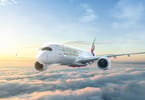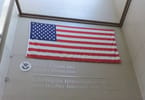China’s private airlines created competition for state-controlled carriers, just as the government wanted. Now, they are the ones suffering from it.
United Eagle Airlines Co., the first private carrier to win government approval, agreed to a takeover by a state-controlled airline last week. East Star Airlines also halted flights two days after rejecting a bid from Air China Ltd.’s state-owned parent. From December, Okay Airways grounded passenger planes for more than a month because of a management dispute.
Private airlines “are no longer a threat,” said Zhou Chi, chairman of government-controlled Shanghai Airlines Co. “They are all in trouble themselves.”
China’s roughly 20 private carriers have stumbled amid a cooling economy, slowing demand and rising capacity. They have also received no government aid. By contrast, China Southern Airlines Co., the nation’s biggest carrier, and other state- controlled airline groups have won bailouts totaling more than 13 billion yuan ($1.9 billion) to help them weather the slowdown.
“Private airlines will never get the same treatment from the government as their state rivals,” said Li Lei, a China Securities Co. analyst in Beijing. “If they can’t overcome all these difficulties on their own, they have to either go bankrupt or agree to be acquired.”
1 Yuan Fares
Chengdu-based United Eagle and East Star both began services in 2005, the year that China first allowed private domestic airlines. The government took the measures to counter what it termed “a seller’s market.” The introduction of private airlines, which now account for about 10 percent of traffic, helped speed growth in Asia’s biggest air-travel market, as they added new routes and offered fares as low as 1 yuan (15 cents).
“Private airlines broke the pricing monopoly that ruled the market for decades,” said Ma Ying, an analyst at Haitong Securities Co. in Shanghai. “If the private carriers fail, the state airlines may go back to higher prices.”
State carriers have already benefited from private airlines’ troubles as it has helped slow a drain of staff, said Shanghai Air’s Zhou.
“None of them can afford to take our pilots any more,” he added. Private airlines’ recruitment “restricted our expansion, but it added to their financial difficulties.”
حڪومتي ضمانتون
Chinese airlines are struggling after travel grew at the slowest pace in five years in 2008 and the industry reported a record 28 billion yuan loss. The government responded by giving 3 billion yuan to China Southern and 9 billion yuan to the parent of China Eastern Airlines Corp., the nation’s No. 3 carrier. Air China’s parent also expects a bailout of at least 3 billion yuan. Shanghai Air and Hainan Airlines Co.’s parent have won funds from local governments.
The aviation regulator will also block competition on new routes for three years to help carriers expand their networks. The protection will cover routes added between March 29 and Oct. 24, which aren’t currently served, the regulator said on its Web site yesterday. More than 90 percent of the routes included in the plan will be operated by state-owned carriers.
Private carriers have benefited from moves to stimulate industrywide demand including tax cuts and lower fuel prices. Still, they have only won direct support in return for ceding control. United Eagle, which operates five planes, sold a 200 million yuan stake to state-controlled Sichuan Airlines Co. because of losses and debts, it said in a statement. The deal raised Sichuan Air’s holdings to 76 percent from 20 percent.
“The capital injection will enable us to be reborn,” United Eagle said. Sichuan Air will appoint a new chairman and president, it added.
East Star Grounding
East Star announced its rejection of a bid from China National Aviation Holding Co., parent of Air China, in a March 13 statement, citing differing management philosophies and China National’s size. The airline, based in Wuhan, grounded its nine planes on March 15 at the request of the city’s government, according to a statement on the aviation regulator’s Web site.
China National will now develop Wuhan into an international hub in partnership with Hubei province, according to an announcement on the provincial government’s Web site. East Star spokesman Wang Yankun wasn’t available for comment in the past week.
Spring Air
Still, some private carriers are growing and avoiding state control. Spring Air, the largest private Chinese carrier by fleet size, spent 100 million yuan hiring more than 30 pilots at the end of last year, said Chairman Wang Zhenghua. It plans to recruit more this year, he added.
“The capital injections for the state carriers did shake up the market,” Wang said. “Still, we’re not too worried about our operations at the moment.”
The carrier, with 12 planes and a debt-to-asset ratio of about 50 percent, intends to take delivery of 16 Airbus SAS A320s in the coming three to four years. It will pay for the aircraft using banks loans, having put plans for a share sale on hold because of plunging stock markets, Wang said. None of the six airlines listed in Shanghai are privately controlled.
“I won’t resist financial aid from the government, but we surely won’t be turned into a state carrier,” Wang said.
Beijing-based Okay Air, which resumed passenger flights in January, is considering seeking new private investors to boost liquidity, said Chairman Wang Junjin.
Okay, which operates 11 planes, including freighters flown for FedEx Corp., may return to profit this year, Wang said. Juneyao Airlines Co., the carrier’s Shanghai-based affiliate, is also hiring staff and plans to add three or four Airbus SAS A320s to its fleet of 10 planes this year, he added.
“It’s up to you if you want the money from the government or to stay independent,” Wang said. “If you do the business well, you won’t be nationalized.”






















